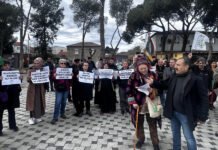Turkish authorities have blocked access to the social media accounts of several pro-Kurdish media outlets, sparking criticism and raising questions about the government’s sincerity in addressing the longstanding Kurdish conflict.
According to the Bianet news website, the restrictions include accounts belonging to Mezopotamya Ajansı (MA), JINNEWS, Yeni Yaşam and SiyasiHaber.
MA’s Turkish-language X account, @Maturkce, with 263,000 followers, is now inaccessible in Turkey. In addition to its X account, MA’s website (mezopotamyaajansi40.com) was blocked on December 27. The agency’s YouTube channel, which has 148,000 subscribers, was also shut down in Turkey at the government’s request. JINNEWS and SiyasiHaber faced similar measures, with access to their X accounts and websites restricted. JINNEWS’s Instagram and YouTube accounts were also blocked earlier this week.
No official explanation for the restrictions has been provided. However, the move has come after government officials signaled a possible shift toward resolving the decades-long Kurdish conflict, raising questions about the timing of the bans.
Far-right politician Devlet Bahçeli, leader of the Nationalist Movement Party (MHP), an ally of President Recep Tayyip Erdoğan, surprised many when he suggested in October that if restrictions imposed on Abdullah Öcalan, the imprisoned leader of the outlawed Kurdistan Workers’ Party (PKK), were lifted, he could appear at the party group meeting of the pro-Kurdish Peoples’ Equality and Democracy Party (DEM Party) and declare the dissolution of the PKK, signaling an end to decades of violence.
The PKK, designated as a terrorist organization by Turkey and its Western allies, has been waging a bloody war in Turkey’s southeast since 1984. Tens of thousands of people have been killed in the conflict.
Bahçeli also suggested that if Öcalan takes this step, there could be legislative action to pave the way for his possible release. Erdoğan backed Bahçeli’s call, saying that a “historic opportunity” to resolve the Kurdish issue should not be missed.
The “Kurdish issue,” a term prevalent in Turkey’s public discourse, refers to the demand for equal rights by the country’s Kurdish population and their struggle for recognition.
However, the latest crackdown on Kurdish media outlets appears to contradict that narrative. Critics argue that the bans expose the government’s reluctance to embrace genuine reform and instead reinforce long-standing patterns of silencing dissent.

The Dicle Fırat Journalists Association (DFG) condemned the bans, describing them as censorship and an attack on freedom of the press.
“All these decisions amount to censorship,” the DFG said. “We will continue to defend freedom of the press and freedom of expression against censorship.”

The DEM Party condemned the move on X, calling it a “shameful decision.”
“No one and no force can suppress the truth, freedom of the press or independent journalism,” the party said.















